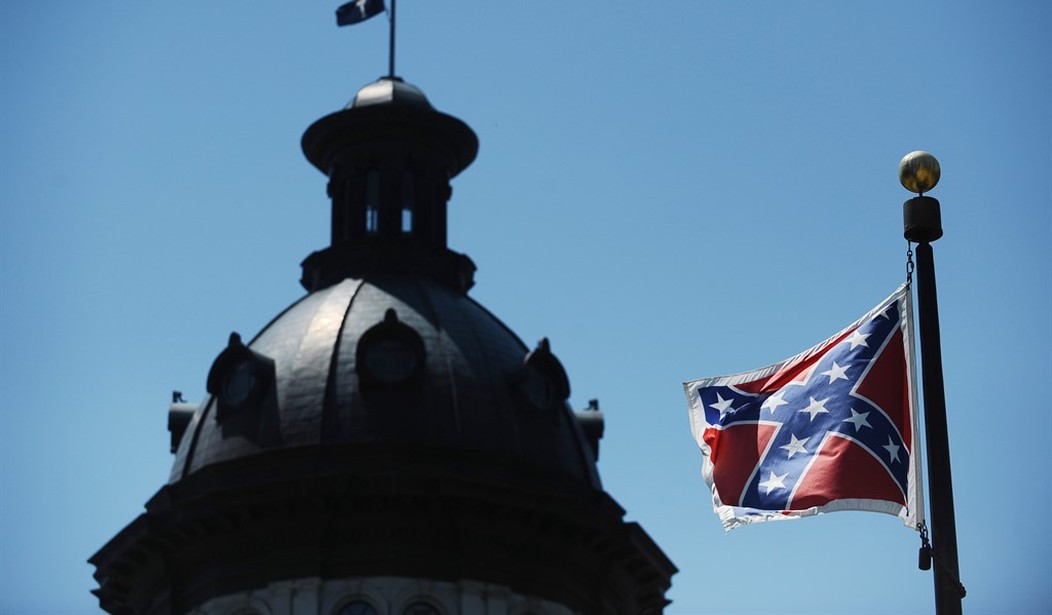Editor's Note: I misread the timeline, folks. My apologies. Flag was moved from the State Capitol to the Soldier's Monument in 2000, where it has remained until today. Sorry for the error.
The South Carolina Senate has voted to take down the Confederate flag, which flies above the State House grounds in Columbia. Now, it's up for debate in the State House (via NYT):
The South Carolina Senate voted Monday to remove the Confederate battle flag from the grounds of the State House. The bipartisan proposal, which emerged after last month’s massacre at a historic black church in Charleston, was approved by a 37-to-3 vote in the Republican-controlled Senate.The Senate has one remaining ratification vote, now virtually assured of success.
The debate will shift to the House of Representatives, which Republicans also dominate, where the timeline for — and tenor of — the debate remains less clear.
The Senate’s vote on Monday marked a resounding shift in South Carolina, where less than three weeks ago removing the Confederate battle flag from a memorial near the State House was viewed as politically impossible.
The killings at Charleston’s Emanuel African Methodist Episcopal Church, however, revived a debate that fractured the legislature about 15 years ago and yielded, at least in the Senate, quick action in the debate over a symbol revered by many whites but regarded as an offensive vestige of segregation and oppression by most blacks.
On Monday, with the desk of a slain member draped in black, the Senate defeated a series of amendments that would have undermined the bill, including one that would have allowed the battle flag to fly each year on Confederate Memorial Day. Later, in a dramatic roll call vote around 4 p.m., the Senate overwhelmingly voted in support of evicting the flag from the grounds of the State House, where it has flown for more than five decades.
Recommended
The issue of removing the flag and placing it at the Soldier’s Monument–a memorial commemorating the Confederate dead–was in stasis since 2000 when lawmakers agreed to move the Confederate flag to the memorial, according to the Post and Courier.
Is this a knee-jerk reaction? A solid majority of Americans see the Confederate flag as a symbol of Southern pride, instead of racism. Moreover, on June 24, Nia-Malika Henderson reported that even some Democrats are cognizant of the fact that such swift action on the issue of the flag could “alienate” future allies, especially after the June 20 rally that was held to remove the Confederate flag from the State House grounds:
I appreciate the rally, but it has no impact on the legislative process," said state Sen. Darryl Jackson, a Democrat who helped hammer out the 2000 compromise. "The politics of the flag are the politics of the primary voter."From his church pulpit on Sunday [June 21], Jackson urged patience on the flag issue, saying later that it could be interpreted as disrespectful to the dead to turn so quickly to politics.
"People are saying let's get some action now, but I don't want to alienate people I will need for a compromise," he said. "If we don't get a bi-partisan consensus, we will be fighting for the next 100 years."
There is a framework for such efforts. South Carolina lawmakers forged a bipartisan agreement this year on body camera legislation after the shooting death of Walter Scott by a white police office.
"This will not be done in a knee-jerk fashion," said Marlon Kimpson, a Democratic state representative. "I'm going to be in focus groups with business leaders and talking to constituents. The massacre opened up an opportunity but to build a super majority will require a lot of work."
























Join the conversation as a VIP Member